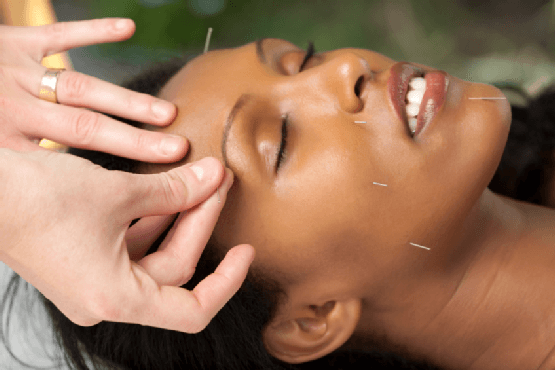Mystic Mix Wellness Tip: Benefits of Acupuncture
This article, as well as many other informative articles on Wellness can be found at Dr. Weil’s Wellness Therapies.

Mystic Mix Wellness Tip: Benefits of Acupuncture
What is Acupuncture?
Contrary to popular Western belief, acupuncture is not just a system for inserting very fine needles into specific body locations to alleviate pain. It is a complete medical protocol focused on correcting imbalances of energy in the body. From its inception in China more than 2,500 years ago, acupuncture has been used traditionally to prevent, diagnose and treat disease, as well as to improve general health.
The traditional explanation for acupuncture’s effectiveness is that it modifies the flow of energy (known as qi or chi) throughout the body, but there is no scientific consensus that this is actually its mechanism of action. Research published in the May 30, 2010 online edition of Nature Neuroscience demonstrated that the effects of needling include influencing the activity of adenosine, an amino acid which becomes active in the skin after an injury to ease pain. This may explain in part why pain relief is often experienced with the therapy. In fact, much research in the West has focused on this pain-relieving effect, rather than acupuncture’s traditional role of balancing energy to address a wide range of disorders, and the more subtle mechanisms that may be responsible for its overall benefits to health.
Acupuncture was popularized in the States during the early 70’s after President Nixon opened relations with China. At the time, a New York Times reporter, James Reston, had an appendectomy in a Chinese hospital using acupuncture as a means to decrease his post-surgical pain.
What is Acupuncture used for?
Because the goal of acupuncture is to promote and restore the balance of energy, which flows throughout the body, it can be used for a wide variety of conditions, from emotional disorders (anxiety, depression) to digestive complaints (nausea, vomiting, irritable bowel syndrome). It can be beneficial for pain syndromes due to an injury or associated with chronic degenerative diseases such as rheumatoid arthritis. It can also be helpful in treating neurological problems like migraines or Parkinson’s disease, or as a rehabilitation strategy for individuals who suffered a stroke. Respiratory conditions, including sinusitis and asthma have been relieved with acupuncture, as have many gynecologic disorders and infertility. Acupuncture has also proved beneficial for reducing fatigue and addictions, and for promoting overall well-being.
Studies in the U.S. indicate that acupuncture can help relieve chronic low back pain, dental pain, migraine headaches, fibromyalgia and symptoms of osteoarthritis. It has been shown to assist in the treatment of emotional pain syndromes such as post-traumatic stress disorder, as well as controlling chemotherapy-induced nausea and vomiting. It has also demonstrated clinical success in achieving pregnancy when used in conjunction with in-vitro fertilization.
What should one expect on a visit to a practitioner of Acupuncture?
Typically, the first visit involves a comprehensive health history assessment. Questions that are included may seem strange, but in Traditional Chinese Medicine (TCM) – which encompasses acupuncture, herbal medicine, massage and other modalities – energy flow and whole-body interaction are the keys to diagnosing all physical disease. For example, the practitioner may ask to examine your tongue, feel your pulse to help determine energy flow, or ask many questions related to bowel habits and diet, even if these seem to have nothing to do with the primary complaint.
After the initial consultation and assessment, the needles are placed in very specific locations. Upon insertion, one may feel a momentary sharp or stinging sensation; however, many report they don’t even feel the majority of the insertions. It is common to experience a deep ache for a short time in some of the points. The needles may then be gently manipulated and some practitioners may use heat or even electricity with the needles.
The depth to which the needles are inserted varies according to the treatment and the practitioner; however, needles should never be positioned deep enough to puncture organs (other than the skin). The needles are usually left in place for five to 20 minutes, usually no longer than 60 minutes, and then removed. Following a treatment, practitioners will usually reassesses the client and often give suggestions for home care. It is also typical to suggest supplemental Chinese herbs to enhance the achievement of energetic balance. Acute symptoms may require only two to four treatments; whereas for chronic cases, it is common to have as many as 12 or more treatments, usually over a course of eight to 10 weeks. Regular monthly visits may be suggested as preventive measures to decrease stress, improve energy or boost immunity.
Are there any side effects or indications where Acupuncture should be avoided?
Those with bleeding disorders or who are taking blood thinners should check with their doctors before having acupuncture. The most common side effects are bleeding and bruising at the site, along with minor pain and soreness. It is recommended that a disinfectant such as alcohol be swabbed over the area prior to needle insertion to decrease the very small possibility of infection. Obviously, needles should be clean and never shared between clients. Rarely, a needle may break. The worst case scenario is a punctured organ.
However, serious complications are extremely rare when acupuncture is performed by a qualified, certified practitioner. A review of the international research literature revealed pneumothorax (a punctured lung) to be the only life-threatening complication to have occurred among tens of thousands of patients over nine separate trials. No post-acupuncture infections were reported in any of the studies.
Is there a governing body that oversees or credentials practitioners?
The practice of granting credentials to acupuncturists is in transition. Although most states require a license to practice acupuncture, the standards vary from state to state. If the practitioner is not a physician, most states require completion of an exam conducted by the National Certification Commission for Acupuncture and Oriental Medicine (NCCAOM). There is sharp division between medical doctors who use acupuncture, and non-M.D.’s who claim to be better trained in the philosophy and techniques of Oriental medicine. For more information about professional standards and licensing requirements for acupuncturists, contact the American Association of Acupuncture and Oriental Medicine at 1-866-455-7999 or www.aaaom.org.
A licensed acupuncturist (L.Ac.) holds a license in one or more states, whereas a person certified by the NCCAOM is called a diplomate of acupuncture (Dipl.Ac.). An oriental medicine doctor (O.M.D.) has obtained advanced training in acupuncture at a recognized school of oriental medicine, which generally requires a minimum of an associate’s degree for admission and offer a three to four year program. These schools are accredited by the Accreditation Commission for Acupuncture and Oriental Medicine (ACAOM).
Each state independently regulates acupuncture licensure. Medical doctors are also legally eligible to perform acupuncture provided they have gone through the adequate training involving 200-300 hours of self-study, have practiced acupuncture for at least 2 years, passed a board examination, and performed at least 500 treatments. The current professional and licensing organization for M.D.’s who practice acupuncture is the American Academy of Medical Acupuncture in El Segundo, California, www.medicalacupuncture.org.
How does one find a practitioner?
If you are considering seeing an acupuncturist, you should discuss this therapy with your primary care physician or integrative medicine practitioner, if you have one. Because acupuncture is growing in popularity, your doctor may be aware of qualified practitioners in the area and offer certain recommendations for you depending on your conditions. This referral may also be required for insurance coverage, depending on your policy. Web search engines can often assist in finding local acupuncturists, and usually provide their credentials for your review if your physician doesn’t have a referral.
Are there other alternative therapies that might work well in conjunction with Acupuncture?
Acupuncture is often performed within the context of TCM, which typically offers dietary interventions, bodywork, and the taking of botanicals in combination with acupuncture treatments. Acupuncture is frequently used in conjunction with “cupping,” an Asian technique designed to increase blood flow to a particular area of concern by using heated glass cups to create suction and promote blood flow to the surface of the skin. Acupuncture can be used effectively with other bodywork therapies including various forms of massage,chiropractic or osteopathic manipulation, as well as different movement therapies such astai chi and qigong.
What is Dr. Weil’s view regarding Acupuncture?
Although there are certification courses offered to medical doctors to learn acupuncture, preferably, the practitioner will be trained in a TCM program to be maximally qualified. An understanding and background in TCM is important in achieving optimal results with acupuncture. Look for practitioners who have thorough knowledge and training in this modality of treatment and who specialize in TCM or acupuncture as their primary form of treatment.
Acupuncture is increasingly recognized by Western medicine as an effective alternative or adjunct to conventional treatments for stroke rehabilitation, headache, menstrual cramps, joint conditions, low back pain, and asthma as well as for the side effects of chemotherapy and nausea related to pregnancy. Dr. Weil often recommends acupuncture for other pain-related conditions, especially osteoarthritis. Acupuncture to alleviate acute sinusitis can be quite effective, as can acupuncture on the ear for quelling addictions. Acupuncture used with TCM can work well for addressing autoimmune conditions and infertility. Because acupuncture has so many positive effects on the body with minimal incidence of side effects, it is often considered in creating an integrative medicine treatment plan.








